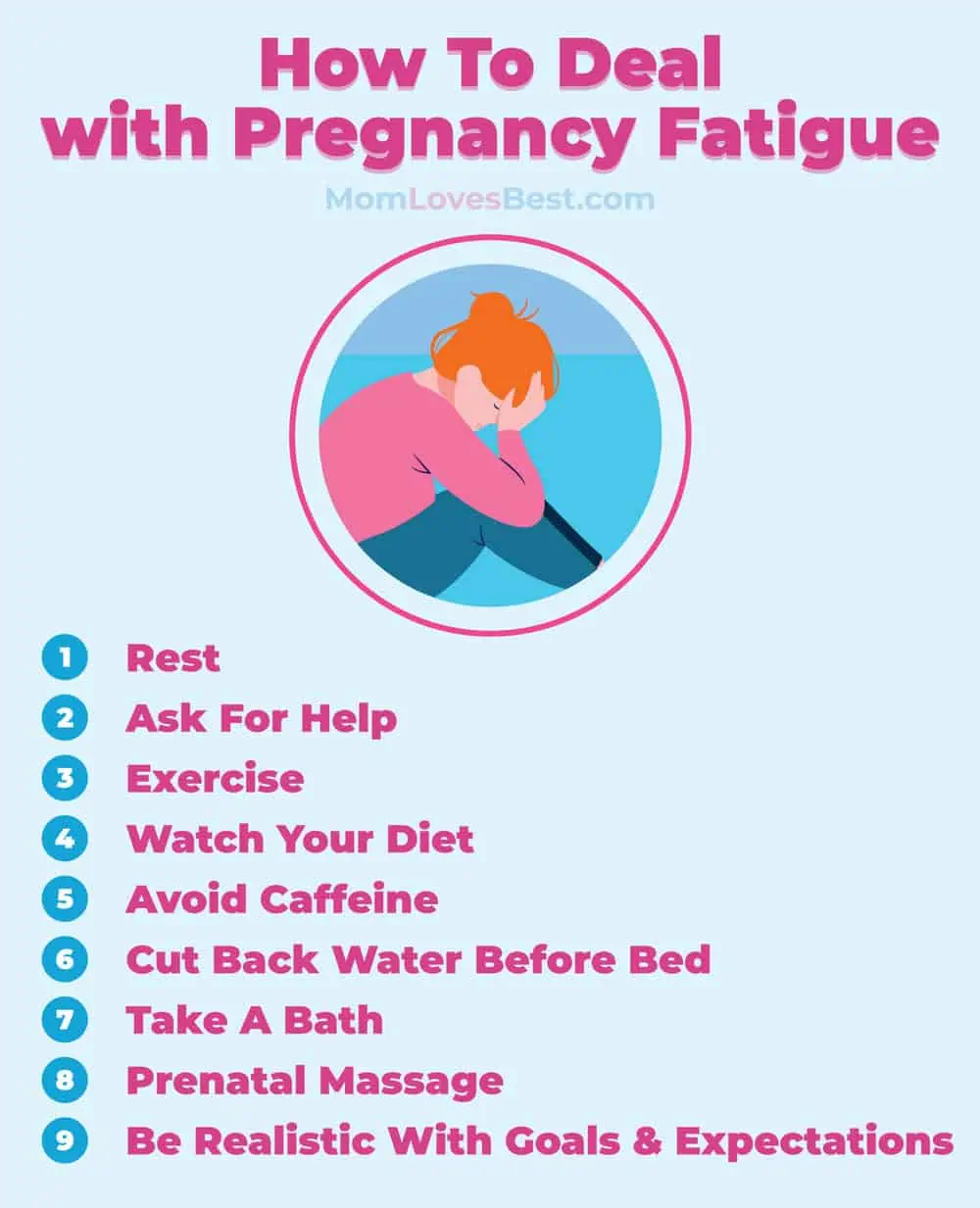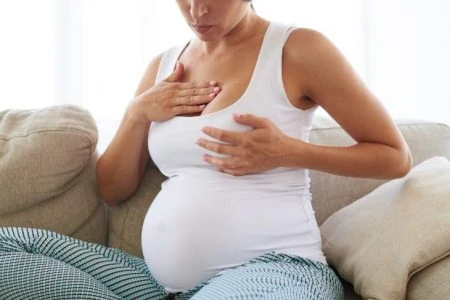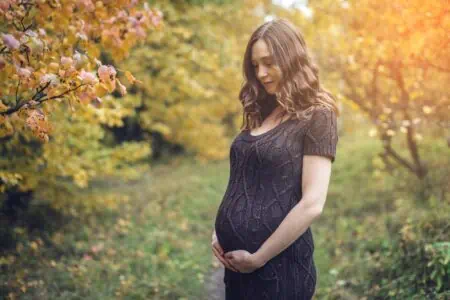Are you struggling to stay awake throughout the day now that you’re pregnant?
Many people associate fatigue with pregnancy. It is an oh-so-common part of the journey to motherhood. But while you may feel some degree of fatigue during your entire pregnancy, there are ways to help increase your energy levels.
We’ll help you understand what’s making you feel so tired and share our tips for reducing pregnancy fatigue.
Key Takeaways
- Pregnancy fatigue is common and can vary by trimester, often peaking in the first and third trimesters.
- Fatigue during pregnancy can result from hormone changes, low blood sugar, and physical changes in the body.
- Although generally normal, extreme fatigue may indicate an underlying health issue like anemia, depression, hypothyroidism, or gestational diabetes.
- To manage pregnancy fatigue, prioritize rest, ask for help, maintain a healthy diet, exercise gently, and practice relaxation techniques like prenatal massage or warm baths.
When Does Pregnancy Fatigue Start?
While the most common sign of pregnancy is a missed period, some women recall extreme fatigue being one of their first indicators.
Mothers who have already given birth will tell you there seems to be a significant difference between regular fatigue and pregnancy fatigue.
Fatigue can be experienced very early on, even just one week after conception. However, don’t immediately associate fatigue with pregnancy — there are many other reasons you could be feeling extra tired!
Now, if you are experiencing a combination of pregnancy symptoms like a missed period, unexplained nausea, tender breasts, and fatigue — you very well may have a bun in the oven.
1. First Trimester Fatigue
It takes an incredible amount of energy to create a human! In the first trimester, you can definitely expect to feel more tired than usual. Your body is adjusting to a massive jump in hormone levels, and your baby is forming all of their major organ systems.
Your increased hormones can also cause you to become sleepier. Not to mention, you will be experiencing lower-than-normal blood sugar and blood pressure levels.
All the physical and emotional changes you are going through can be enough to cause extreme exhaustion (1).
Don’t be alarmed, but you will probably be blindsided by how much your energy levels drop during this trimester.
2. Second Trimester Fatigue
The second trimester is often described as being like a second wind. You will almost feel like yourself again, minus the growing tiny human inside you, of course.
However, some women’s extreme fatigue carries over into their second trimester. Although it may still be present, there is hope — it should decrease once the placenta is fully developed (2).
If your fatigue levels still seem to be extreme during this trimester, you should relay that information to your doctor.
The second trimester is usually when you have enough energy to get stuff done. Many moms will finalize the nursery and prepare everything before the third trimester rolls around.
So you’re feeling pretty good now, huh? Don’t be fooled by all of your newfound energy. You will notice your energy levels start to dwindle again with the arrival of the third trimester.
3. Third Trimester Fatigue
The third trimester can lead to fatigue because now you are carrying around all that extra baby weight. Not only are you carrying a baby with you everywhere you go, but you are also dealing with increased blood volume, the weight you have gained from eating for two, amniotic fluid, and a placenta! Going through your day-to-day activities with a bowling ball and its accessories accompanying you wherever you go can be exhausting.
You are likely becoming restless at night, having trouble getting comfortable, and making frequent trips to the bathroom.
The combination of all of these would leave even the best of us feeling super tired. One of your favorite parts of the day is probably crawling into your bed — and there should be no shame in that!
You need all the rest you can get because once your little one is here, you probably won’t remember what crawling into your bed feels like, let alone sleeping through the night!
Maybe You'll Sail Through
Why Does Pregnancy Make You Tired?
It’s hard to believe that such a little baby that hasn’t even been born yet can already impact your energy levels, but there are many reasons why that’s true. Many people think they won’t be tired until they start sporting a baby bump, but boy, are they wrong!
Your body is busy adjusting hormones to maintain your health and that of your developing baby. The idea of supporting your life and another one should be a solid indication of why you are tired (3).
There are several medical reasons why you may feel tired. Nausea and vomiting from morning sickness can leave you feeling weak and tired. It is important to replenish as many nutrients as possible when enduring morning sickness. Dehydration during pregnancy and lack of food can cause low blood sugar and make you more tired. They can also cause other issues for you and your baby.
Other conditions such as anemia, low blood sugar, depression, or hypothyroidism can also contribute to low energy levels. If you suspect any of these, it is a good idea to talk to your doctor.
Your nightly sleep has probably been interrupted because you cannot get comfortable, you have to make an excessive amount of trips to the bathroom, or maybe you are having leg cramps. You will be amazed at how many times you can still wake up in the middle of the night even though you are exhausted.
Don't Beat Yourself Up
Can Being Tired Hurt Your Baby?
As long as you don’t have any underlying health conditions, fatigue is just a normal part of pregnancy.
The process of creating a life is a daunting task, but it is not harmful to your baby.
Feeling fatigued is a sign your body is properly making accommodations for your baby. The circulating hormones are likely the culprit for your first episodes of fatigue (4).
Can Fatigue Be a Sign of a Health Problem?
Fatigue is a common symptom of many illnesses. But since it is an extremely common symptom of pregnancy, you could easily overlook other potential issues.
These are some of the other health problems related to pregnancy that could be causing your extreme fatigue:
- Anemia: Pregnancy puts you at an increased risk of developing an iron deficiency. A lack of iron can deplete your red blood cells, which transport oxygen to your tissues. This can leave you feeling exhausted and weak (5).
- Depression: Feeling tired is a common side effect of depression. If you feel hopeless, extremely sad, or unable to complete your daily activities, depression may be to blame. If you believe you are suffering from depression, you should reach out to your doctor (6).
- Hypothyroidism: If identified, you can easily treat hypothyroidism. It is difficult to notice because many of the symptoms are also related to pregnancy. If you notice increased fatigue, constipation, or an intolerance to heat, those are signs that you may have hypothyroidism (7).
- Gestational Diabetes: Extreme fatigue could be a symptom of gestational diabetes. This is diabetes that occurs when you are pregnant and is generally gone shortly after you give birth. The hormones in your body can interfere with your insulin production, resulting in unregulated blood sugar levels. Doctors will administer a glucose test to check for this in the second trimester. Gestational diabetes can also be accompanied by extreme thirst and frequent urination (8).
If you think you may have an underlying issue, you should contact your doctor. A major red flag is if your fatigue hits you rather quickly and does not lessen even after a significant rest.
How To Deal with Pregnancy Fatigue
While fatigue is inevitable, there are ways for you to restore a little more energy into your daily routine.
- Rest: You may feel like you have to be superwoman and get everything done, but you need your rest. You shouldn’t expect to accomplish just as much now as you did before you were pregnant. It is OK for that load of laundry to wait until tomorrow. Try to cherish these last moments of you being the priority, and make sure you are taking care of yourself. Go to bed early, and take that extra nap — you have more than earned it.
- Ask For Help: If you feel pressured to accomplish many tasks, don’t be afraid to ask your partner to help balance the load. Some women feel guilty doing this, but it’s OK to ask for help. You and your partner are in this together. Being pregnant is a full-time job, so asking for help with the groceries or chores around the house is definitely warranted.
- Exercise: If you are already tired, exercise is probably the furthest thing from your mind. But exercising doesn’t mean you need to run a marathon or lift weights at the gym. A 30-minute walk outside can have significant benefits. Swimming is also a great exercise option for pregnant women. The water can take the strain off your body by making you feel almost weightless. But be sure to check with your doctor before beginning any exercise routine if you did not regularly exercise before becoming pregnant. As a side benefit, you can wear your maternity workout clothes in the first few weeks after delivery when you’re still trying to lose that baby weight.
- Watch Your Diet: You are eating for two, and if you are slacking in the meals department, you could be adding to your fatigue. Your body relies on extra nutrition, and eating often can help maintain your blood sugar levels. If your blood sugar gets low, it can directly affect your energy levels. A healthy, well-balanced diet is the best option for you and your growing baby. You can dodge those super fatiguing sugar crashes by avoiding any sugary pregnancy cravings. Eat a diet with a good balance of protein and healthy carbohydrates to maintain blood sugar levels.
- Avoid Caffeine: You may be tempted to indulge in a cup of coffee to help give you a quick energy boost, but the crash will leave you feeling more tired than before. Caffeine is also a stimulant, so it is best to avoid it during pregnancy or limit it to under 200 milligrams per day.
- Cut Back Before Bed: If you drink a lot of water before bed, you are only adding to the bathroom trips you will have to take in the middle of the night. By cutting back on liquids even an hour before bed, you can decrease the amount of middle-of-the-night bathroom breaks. However, staying hydrated is an essential part of pregnancy, so make sure you drink plenty of fluids throughout the day.
- Take a Bath: A bath can be the perfect method of relaxation. Not only will it help rejuvenate you, but it can also soothe your aches and pains. Just make sure the water isn’t too hot because that can pose a danger to your baby. Also, you can become a little top-heavy toward the end of your pregnancy. Make sure you are able to safely get in and out of the bathtub, and ask for help if you think you’ll have trouble.
- Prenatal Massage: If you have trouble unwinding, a prenatal massage could be the perfect solution. This will force you to get some much-needed relaxation. Pregnancy can leave you feeling tense. A prenatal massage can help heal your aches and pains — and it promotes better sleep. Find a massage therapist who has been specially trained in prenatal massage.
- Be Realistic: Don’t set goals and expectations that you know will be difficult to achieve. This will only cause you to push yourself much harder than you need to and will probably leave you feeling disappointed.
- Hang in There: Your fatigue may be getting the best of you, but it won’t last forever. Just take it one day at a time. Pretty soon, you will have your beautiful baby keeping you company at all hours of the night and day! If your fatigue impacts your daily life significantly, mention it to your doctor. They may have recommendations to help you get some much-needed energy back.
Remember
When Does Pregnancy Fatigue End?
You are probably going to experience some fatigue throughout your pregnancy. There will be times when it seems to be steady, but there will also be times when your fatigue appears to spike upwards.
Fatigue levels typically vary by trimester. For example, hormone-induced fatigue may end during the second trimester, but weight-bearing fatigue will begin during the third trimester.
Your body needs more rest now than it has in a long time, so make sure you take all the time you need to help restore your energy.
When your pregnancy ends, your pregnancy-related fatigue will diminish, but that doesn’t mean your days of being tired are over. Once your little baby makes their entrance into this world, a whole new type of fatigue begins.
FAQs
The Bottom Line
You are going to be significantly more tired when you are pregnant. Remember, fatigue is a normal part of pregnancy, but it can sometimes be a symptom of an underlying issue. Don’t hesitate to voice any concerns to your doctor.
Listen to your body, and know when enough is enough. Don’t push yourself. If you feel exhausted, don’t be afraid to take a nap.
Your fatigue will probably peak in the first trimester, diminish in the second, and then return during the third. All pregnancies are unique, so your levels of fatigue can differ from those that are considered “normal.”
Pregnancy is an adventure. You will experience numerous ups and downs, but remember, it’s a marathon, not a sprint. You will reach the finish line in due time, and the wait will be worth it.












